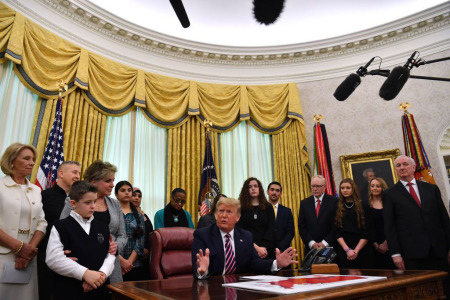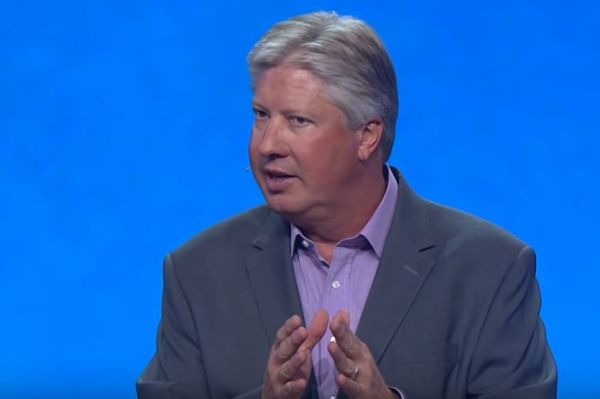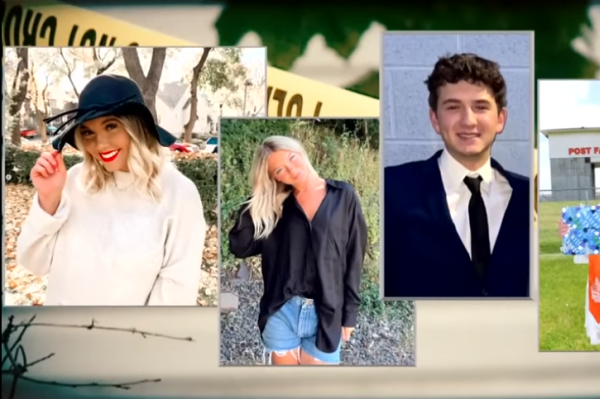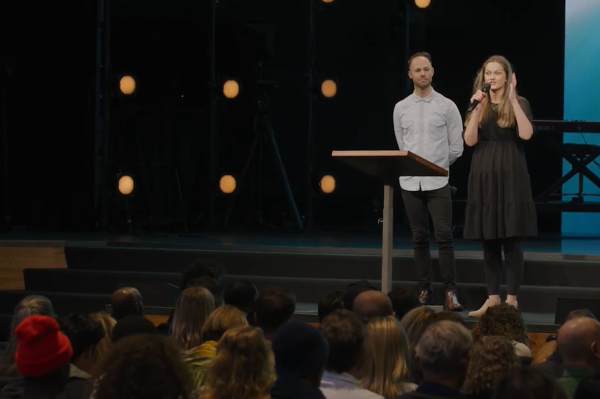Trump announces school prayer guidance; 9 agencies draft religious freedom rules

On National Religious Freedom Day Thursday, the White House announced several new rules and memos designed to roll back "discriminatory" federal regulations as well as promote teachers' and students' right to pray in public schools.
President Donald Trump was joined in the Oval Office by Christian, Jewish and Muslim students who have suffered some form of discrimination as he introduced new regulations and guidance promoting religious freedom.
Among them is the announcement that the U.S. Education Department will send out memos to secretaries and administrators in all 50 states stressing that they can’t prevent teachers or students from praying in public schools.
The goal is to "further safeguard students’ constitutionally protected right to pray in school" and to let public school administrators know that they can lose federal funding if they violate students’ religious freedom.
Additionally, the administration is set to publish draft rules issued by nine federal agencies that ensure less regulation on religious organizations and social service providers.
The administration said the rules would "eliminate burdensome Obama-era requirements that unfairly imposed unique regulatory burdens only on religious organizations."
Trump said during a news conference that he doesn't think there is anything more important than "the right to pray."
"In public schools around the country, authorities are stopping students and teachers from praying, sharing their faith or following their religious beliefs. It is totally unacceptable. You see it on the football field, you see it so many times where they are stopped from praying. We are doing something to stop that."
Trump stressed that "there is a cultural war" and called out a "totalitarian impulse on the far-left that seeks to punish, restrict and even prohibit religious expression."
"You have a side that believes so strongly in prayer and it is being restricted and it's getting worse and worse," he said. "And I think we have made a big impact. We have loosened it up a lot and I want to loosen it up totally."
The Department of Education has updated a 2003 guidance on prayer in public schools stating that local education agencies must, under the Elementary and Secondary Education Act of 1965, certify that they do "not have any policy that prevents, or otherwise denies participation in, constitutionally protected prayer."
The guidance also reiterates that states are required to report local education agencies that deny a student or employee the right to "engage in constitutionally protected prayer." Those reports must be filed by Nov. 1 of every year.
Some critics argue that the right to prayer is already protected under federal law.
“Private prayer, to the extent that it would ever be interfered with, is already protected by the First Amendment and there are very, very few cases where any government official has tried to interfere with a private student’s right to pray,” Michigan State University law professor Frank Ravitch, author of School Prayer And Discrimination: The Civil Rights of Religious Minorities and Dissenters, told Time magazine.
But White House Director of the Domestic Policy Council, Joe Grogan, told NPR that existing provisions to protect school prayer established under the No Child Left Behind law have been eroded as a result of hostility to religion and religious institutions.
"We're trying across the board to invite religious institutions and people of faith back into the public square and say, 'Look, your views are just as valid as anybody else's,'" Grogan was quoted as saying. "'And, by the way, they're protected by the First Amendment to the Constitution.'"
Secular legal groups have regularly pressured local school districts to end any conceived entanglement with religion, including school Bible clubs. Additionally, some students have faced obstacles when trying to form religious clubs on public school campuses.
The Department of Education also issued a proposed rule "ensuring the equal treatment and constitutional rights of religious organizations and faith-based institutions, as well as First Amendment freedoms owed to students on campus."
"Our actions today will protect the constitutional rights of students, teachers, and faith-based institutions," Secretary Betsy DeVos said in a statement. "The department's efforts will level the playing field between religious and non-religious organizations competing for federal grants, as well as protect First Amendment freedoms on campus and the religious liberty of faith-based institutions."
Alliance Defending Freedom, a legal nonprofit that has secured victories in nearly 400 campuses free speech cases since its founding, said in a statement that students today still find their faith “under attack” as some are “denied the freedom to pray together during free times.”
“The president’s directive requiring all public schools to respect their students’ religious liberty, is also a welcome step to remedy these attacks on people of faith,” ADF President Michael Farris said in a statement.
One student who visited Trump in the Oval Office Thursday was ADF client Chase Windebank, a senior at Pine Creek High School in Colorado Springs, Colorado. Windebank said he was told by administrators that he and his friends could no longer meet to pray and discuss religious topics during their free-time period.
Texas high school student Hannah Allen also met with the president.
"Me and a group of students wanted to pray for our former classmate's brother who had got hurt in an accident," Allen said. "After the prayer, our principal told us not to do that again. The next day, he said parents had called and complain. He said we could pray but we had to hide in the gym or behind a curtain or somewhere away from everyone else."
The administration also announced new rules and guidance memos to be issued by nine federal agencies to ensure less regulation on religious organizations and social service providers.
States and government contractors will be instructed to better protect the equal opportunity rights of churches and religious organizations.
New rules issued by several departments are set to publish Friday in the Federal Register.
The agencies issuing the rules are the Department of Health and Human Services, the Department of Homeland Security, the Agency for International Development, Department of Agriculture, Department of Education, Department of Housing and Urban Development, Department of Justice, Department of Labor and the Department of Veterans Affairs.
According to BuzzFeed, the White House Office of Management and Budget will inform states that grants must be dispersed to churches, religious organizations as well as secular groups. Additionally, federal grantees will be told they can’t disadvantage religious organizations when they apply for sub-awards.
In 2017, the Supreme Court ruled in the Trinity Lutheran Church of Columbia v. Comer case that states can’t discriminate against churches apply for secular aid funding.
Grogan told reporters that the new rule would undo damage caused by amendments in several states that prevent tax dollars from going to religious organizations. Critics have argued that “Blaine amendments” are vestiges of anti-Catholic sentiment that was present in the U.S. during the 1800s.
The announcement was seen by some as an opportunity to bolster the president’s support with his conservative evangelical base as Trump made a vow to protect prayer in schools during the launch event of the “Evangelicals for Trump” coalition at a Miami megachurch earlier this month.
The announcements were widely praised by conservative evangelical leaders who have a close relationship with the administration.
"President Trump and his administration are taking on the bullies that have been intimidating school officials and bullying students with their often baseless lawsuits,” FRC President Tony Perkins, an influential conservative evangelical leader, said in a statement. “No longer will students have to stand alone in the defense of their religious freedom as these anti-faith organizations seek to rob students in public schools of any form of religious expression.”
Johnnie Moore, an evangelical communications executive who has frequently engaged with the Trump administration, said that the new policies are “more reasons why President Trump has no modern peer as a champion of religious freedom.”
“We now live in an America with more freedom of religion and belief for people to worship the God they believe in, or none at all,” Moore said. “We no longer have a government paranoid by the role of religion in public life. Because of the president’s unprecedented court appointments, I believe this is a generational shift.”
Moore said that when he was a child he would hold prayer meetings outside of school and before school because of “total paranoia” displayed by school officials around the issue of "separation of church and state." He said students were “required” to pray outside.
“Even in those environments that were more open, the approval processes seemed intentionally burdensome,” Moore said. “I was once called into a principal’s office in one of my high schools for trying to have a Bible study during the lunch hour. It was totally absurd.”
Moore stressed that the White House isn’t saying whether one should pray or to whom one should pray, but rather that the “separation of church and state” principle wasn’t “intended to suppress a vibrant religious life in America but to facilitate it.”
“Jefferson’s letter to the Danbury Baptists, where he referenced this separation, was actually more about protecting the church from the State than the State from the church,” Moore stressed.
The announcements also earned the praise of Samuel Rodriguez, president of the National Hispanic Christian Leadership Coalition. One voting block Trump will look to gain more support from in 2020 is the Latino vote as he earned 28 percent of the Hispanic vote in 2016.
“This is a decision that should be celebrated by Democrats and by Republicans, by the religious and the irreligious, by all Americans from sea to shining sea who recognize the brilliance of the American idea wasn’t in a fear of religion but in the vibrancy of faith,” Rodriguez said.
“Faith to believe that God exists or that he doesn’t, faith to pray before we legislate or anchor our pledge and our currency in subservience to a higher power. Faith to sing the song of freedom as the arc of history bends toward justice. Our children need not fear faith, especially in our sacred institutions of learning.”
Follow Samuel Smith on Twitter: @IamSamSmith
or Facebook: SamuelSmithCP





















